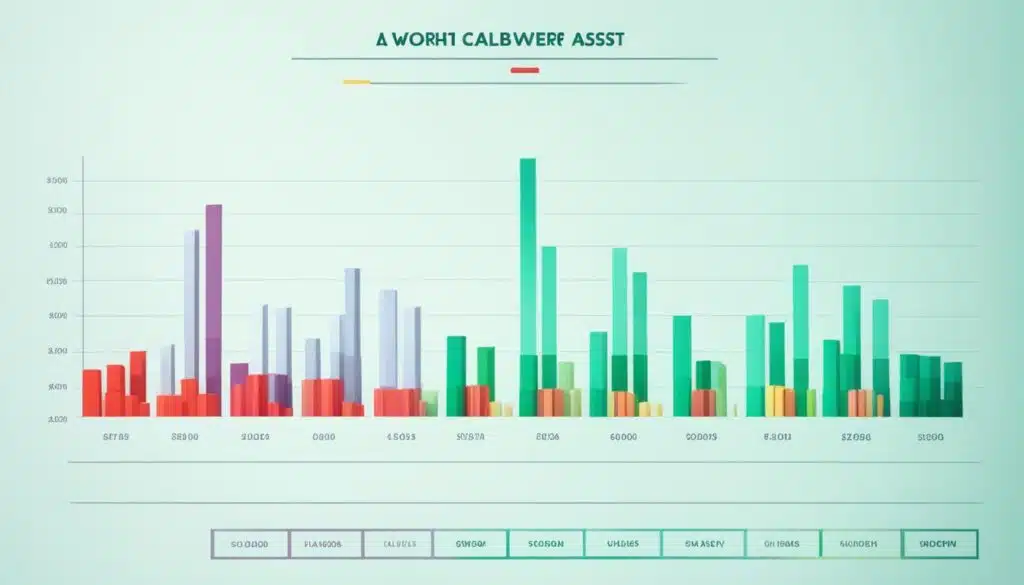When it comes to personal finance, having the right knowledge and skills is crucial to ensure lasting security and grow your wealth. Making wise financial decisions and implementing effective strategies can pave the way for a prosperous future. In this article, we will provide you with the top 10 personal finance tips that can help you achieve financial wisdom and secure your future.
Key Takeaways:
- Implementing these personal finance tips can help you secure your future.
- Financial wisdom can lead to lasting security and the growth of your wealth.
- By following these tips, you can make informed decisions about your money.
- Building a solid financial foundation is essential for long-term stability.
- Take control of your finances and prioritize your financial well-being.
Create a Financial Calendar
One of the first steps in managing your finances effectively is to create a financial calendar. With a financial calendar, you can keep track of important money-related tasks and stay organized with your financial obligations. By setting reminders and establishing a routine, you can ensure that you never miss crucial deadlines or appointments. This calendar will help you manage your finances efficiently so that you can focus on achieving your financial goals.
Also Read: How To Get A Loan?
Here are some key tasks you should include in your financial calendar:
- Pay Quarterly Taxes: As a self-employed individual or business owner, it is important to pay your quarterly taxes on time. By adding this task to your financial calendar, you can avoid penalties and ensure that your tax payments are made promptly.
- Pull Credit Report: Regularly checking your credit report is essential for maintaining a healthy credit score. Schedule a reminder in your financial calendar to pull your credit report annually or as needed. This will help you detect any errors or discrepancies and take appropriate actions to resolve them.
- Track Bill Payments: Stay on top of your bill payments by scheduling reminders in your financial calendar. By knowing when your bills are due, you can avoid late fees and maintain a good payment history.
- Monitor Subscription Renewals: Many of us have multiple subscriptions like streaming services, gym memberships, or magazine subscriptions. Keep track of their renewal dates in your financial calendar to assess their value and avoid unwanted charges if you decide to cancel.
By incorporating appointment reminders into your financial calendar, you can stay organized and prioritize your financial well-being. Treat your financial tasks as important as any other appointment, just like a visit to the doctor or a car tune-up. With a financial calendar, you will develop the habit of being proactive in managing your money and ensuring financial stability.
Additionally, consider using digital tools or apps that can sync with your financial calendar and send you notifications for upcoming tasks. This can further automate and streamline your financial management process, making it even easier to stay on top of your financial obligations.
Remember, creating a financial calendar is an essential step towards taking control of your finances. With proper planning and organization, you can avoid missed deadlines, stay on track with your financial goals, and achieve lasting financial success.
Check Your Interest Rate
When it comes to managing your finances, understanding and monitoring interest rates is crucial. Whether you have loans or savings accounts, the interest rates associated with them can significantly impact your financial well-being. By staying informed and proactive, you can make informed decisions about debt management and optimize your savings.
Also Read: Gentle Skincare Routine For Dry And Sensitive Skin
Pay Off High-Interest Loans First
One important aspect of interest rates to focus on is the interest rate on your loans. Start by identifying the loans with the highest interest rates and prioritize paying them off. By tackling high-interest loans first, you can minimize the additional money you spend on interest over the loan’s lifetime. It’s a strategic way to reduce debt and free up more of your budget for saving and investing.
Optimize Your Savings Account
On the other side of the coin, it’s essential to seek out savings accounts that offer competitive interest rates. When choosing a savings account, look for options that provide a high-interest rate to maximize the growth of your savings over time. By doing so, you can make your money work harder for you and achieve your financial goals faster.
Understanding Compound Interest
Compound interest is a powerful concept that can work in your favor when it comes to saving and investing. It refers to the interest you earn or accrue on both the initial principal and any accumulated interest. In simple terms, compound interest allows your savings or investments to grow exponentially over time. By understanding how compound interest works, you can make smart decisions about saving, investing, and managing your debt.
Also Read: Skincare For Dark Spots: Fade And Even Tone Tips
Debt Management and Interest Rates
When it comes to managing debt, understanding interest rates is key. By identifying loans with high interest rates and creating a plan to prioritize and pay them off, you can reduce the amount of money you spend on interest. This, in turn, accelerates your journey towards financial freedom. Additionally, staying on top of your savings account interest rate allows you to make the most of your hard-earned money and build a solid financial foundation.
Track Your Net Worth
Tracking your net worth is a crucial step in understanding your financial standing and making progress toward your financial goals. Net worth is the difference between your assets and your debt, and monitoring it allows you to evaluate your financial health and identify areas for improvement.
By regularly assessing your net worth, you gain valuable insights into your overall financial progress and can make informed decisions about your financial goals. It helps you understand whether you’re accumulating wealth or accumulating debt, and whether you’re on track to achieve your desired financial outcomes.
Also Read: Glowing Summer Skin: Skincare Tips For Summer
Here’s a simple formula to calculate your net worth:
Net Worth = Total Assets – Total Debt
To ensure an accurate calculation, gather all relevant financial information, including the value of your assets (such as cash, investments, real estate, and personal possessions) and the total amount of your debts (such as mortgages, loans, and credit card balances).
Once you have your net worth figure, you can begin tracking its progress over time. This can help you make adjustments to your financial strategy or celebrate your achievements as you see your net worth increase.
Consider creating a table to track your net worth on a regular basis. Here’s an example:
| Assets | Amount |
|---|---|
| Cash | $10,000 |
| Investments | $50,000 |
| Real Estate | $200,000 |
| Personal Possessions | $5,000 |
| Total Assets | $265,000 |
| Debts | Amount |
| Mortgage | $150,000 |
| Student Loans | $35,000 |
| Credit Card Debt | $5,000 |
| Total Debts | $190,000 |
| Net Worth | $75,000 |
Tracking your net worth is a powerful tool in helping you stay on top of your financial goals and progress. Use it to evaluate your financial health, make informed decisions, and take control of your financial future.
Also Read: Protect Your Skin: Benefits Of Using Sunscreen
By monitoring your net worth, you can assess your progress towards financial goals and identify any areas where you may need to make adjustments.
Set a Budget, Period
Setting a budget is the foundation of personal finance. It provides a roadmap for achieving your financial goals and helps you maintain control over your spending. A well-planned budget can help you prioritize your expenses, save money, and make progress towards your long-term financial objectives.
Why Budgeting is Important
Budgeting is essential for maintaining a healthy financial life. It allows you to:
- Track Your Spending: Budgeting helps you understand where your money is going. By analyzing your spending habits, you can identify areas where you can cut back and save.
- Reach Your Financial Goals: Whether it’s saving for a down payment on a house, paying off debt, or planning for retirement, a budget helps you allocate resources towards your financial goals.
- Avoid Debt: By setting limits on your spending, you can prevent yourself from accumulating unnecessary debt that can hinder your financial progress.
Creating Your Personal Budget
Now that you understand the importance of budgeting, it’s time to create your personal budget. Use the following steps to get started:
- Calculate Your Income: Start by determining your total monthly income. Include all sources of income, such as your salary, side hustles, or rental income.
- List Your Expenses: Make a list of all your monthly expenses, including fixed expenses like rent or mortgage payments, utility bills, and insurance. Don’t forget to account for variable expenses like groceries, transportation, and entertainment.
- Set Financial Goals: Identify your short-term and long-term financial goals. Whether it’s saving for a vacation, paying off debt, or planning for retirement, assign a portion of your income towards these goals.
- Allocate Your Income: Assign a specific percentage of your income to each expense category based on your priorities. Be realistic and make adjustments as needed to ensure you can cover your essential expenses while still saving for the future.
- Track and Revise: Regularly monitor your budget and track your expenses. Make adjustments as necessary to ensure you stay on track and meet your financial goals.
Remember, a budget is a flexible tool that can be adjusted as your financial situation changes. It’s important to review and revise your budget regularly to accommodate any unexpected expenses or changes in income.
Visualizing Your Budget
A visual representation can be helpful to grasp your budget at a glance. Here’s an example of a simple budget table:
| Expense Category | Percentage of Income |
|---|---|
| Housing | 30% |
| Transportation | 15% |
| Food | 10% |
| Debt Repayment | 20% |
| Savings | 15% |
| Entertainment | 10% |
Remember, these percentages are not set in stone and can be adjusted based on your personal financial situation and priorities.
Consider an All-Cash Diet
If you find yourself consistently overspending, adopting an all-cash diet can be a game-changer. This involves using only cash for your purchases instead of relying on credit or debit cards. The cash diet can help you break free from bad spending habits and regain control of your finances.
When you rely on cash, you become more aware of your spending patterns and are less likely to make impulsive purchases. Seeing the tangible money leaving your wallet creates a sense of consciousness and accountability, promoting financial discipline.
“The cash diet is a powerful tool to improve financial discipline and reduce overspending. It creates a physical connection between your spending and your money, helping you make conscious and intentional choices.” – Financial Expert
Switching to an all-cash diet also eliminates the risk of accumulating credit card debt and overspending beyond your means. You can only spend what you have, which encourages a financially responsible mindset.
Furthermore, using cash prevents the temptation to rely on credit cards for unnecessary purchases or impulse buys. By sticking to a cash-only policy, you must prioritize your expenses and make thoughtful decisions about how you allocate your funds.
Benefits of an All-Cash Diet:
- Increased awareness of spending habits
- Reduced risk of accumulating credit card debt
- Improved financial discipline
- Forces you to prioritize expenses
- Encourages conscious and intentional spending
Cash vs. Card Spending
| Category | Cash Spending | Card Spending |
|---|---|---|
| Groceries | $200 | $250 |
| Dining Out | $100 | $150 |
| Entertainment | $50 | $100 |
| Total | $350 | $500 |
The table above illustrates how adopting an all-cash diet can help you reduce your spending. By using cash for groceries, dining out, and entertainment, you can curb excess expenses and foster financial discipline.
In conclusion, transitioning to an all-cash diet is a practical approach to control overspending and cultivate better financial habits. By embracing this method, you can regain control of your finances, make more conscious spending choices, and embark on a path towards lasting financial well-being.
Take a Daily Money Minute
Taking just one minute each day to review your financial transactions can have a significant impact on your financial well-being. This simple practice helps you identify any potential issues, stay on track with your goals, and set a positive spending tone for the rest of the day.
Tracking Your Progress
By reviewing your financial transactions daily, you can keep a close eye on your goal progress. It allows you to monitor your income and expenses, ensuring that you are on the right track towards your financial objectives. Whether you’re saving for a down payment, paying off debt, or building an emergency fund, daily tracking keeps you accountable and motivated.
Identifying Spending Habits
Regularly reviewing your financial transactions exposes your spending habits. It provides valuable insight into where your money is going and whether your spending aligns with your financial priorities. You can identify any unnecessary or impulsive purchases and make adjustments to improve your financial discipline.
Setting a Positive Tone
Starting each day with a quick review of your financial transactions sets a positive tone for your overall spending habits. It helps you approach your daily expenses with intention and mindfulness, making mindful choices that align with your financial goals. This proactive mindset can lead to better financial decision-making throughout the day.
Embracing Financial Discipline
Consistently taking a daily money minute cultivates a habit of financial discipline. It encourages you to be more aware of your financial choices and fosters responsibility for your financial well-being. Over time, this practice can help you develop better money management skills and build a stronger financial foundation.
Remember:
“A minute spent reviewing your financial transactions each day is a small investment that can yield significant financial rewards.”
Allocate at Least 20% of Your Income Toward Financial Priorities
When it comes to securing your future and building long-term financial stability, it is crucial to allocate a significant portion of your income towards financial priorities. By prioritizing your financial well-being, you can take proactive steps towards achieving your goals and ensuring a secure and prosperous future.
One of the key financial priorities to consider is building an emergency savings fund. Life is unpredictable, and having a financial safety net in place can provide peace of mind and protect you from unexpected expenses. Aim to save at least three to six months’ worth of living expenses in an easily accessible emergency fund.
Another crucial financial priority is debt payoff. High-interest debt can hinder your financial progress and limit your ability to achieve other goals. By allocating a portion of your income towards paying off debt, you can reduce interest payments and eventually become debt-free. Prioritize paying off debts with the highest interest rates first to save the most money in the long run.
Additionally, retirement savings should be a top financial priority. It’s never too early to start saving for retirement, and the sooner you begin, the more time your money has to grow. Contribute regularly to retirement accounts such as a 401(k) or an individual retirement account (IRA) to ensure a comfortable retirement.
By allocating at least 20% of your income towards these financial priorities, you are taking control of your financial future. Prioritizing emergency savings, debt payoff, and retirement savings ensures that you have a strong foundation for financial well-being and sets you up for a more secure and prosperous future.
Remember, financial priorities may vary based on individual circumstances and goals. It’s important to carefully assess your own financial situation and make adjustments accordingly. Consulting with a financial advisor can provide valuable insights and guidance tailored to your specific needs.
Budget About 30% of Your Income for Lifestyle Spending
When it comes to managing your finances, it’s important to strike a balance between saving for the future and enjoying the present. Allocating about 30% of your income for lifestyle spending allows you to indulge in discretionary expenses without compromising your long-term financial goals.
Lifestyle spending encompasses various activities that enhance your quality of life, such as dining out at restaurants, engaging in entertainment, and pursuing leisure activities. While it’s essential to prioritize saving and financial stability, setting aside a portion of your income for these discretionary expenses can contribute to your overall well-being and happiness.
By creating a dedicated budget for lifestyle spending, you can have a clear understanding of how much you can afford to allocate for these activities each month. This not only helps you manage your expenses effectively but also enables you to make informed decisions about your spending habits.
The Benefits of Budgeting for Lifestyle Spending
A budget ensures that you have control over your finances and empowers you to make conscious choices about how you allocate your money. When it comes to lifestyle spending, having a budget offers several advantages:
- Financial Awareness: Budgeting helps you become more aware of where your money is going, allowing you to identify areas where you may be overspending and make adjustments as needed.
- Prioritization: By budgeting for lifestyle spending, you can prioritize the activities and experiences that bring you the most joy, while still maintaining financial discipline in other areas of your life.
- Goal Alignment: A budget ensures that your lifestyle spending aligns with your overarching financial goals. It helps you achieve a healthy balance between enjoying the present and planning for the future.
It’s worth noting that the 30% guideline is a general recommendation. Your own budget allocation for lifestyle spending may vary depending on your personal financial circumstances and goals. Adjust the percentage accordingly to suit your needs and priorities.
An Example Budget for Lifestyle Spending
To demonstrate how budgeting for lifestyle spending can work in practice, here’s an example of how you could allocate your income:
| Expense Category | Budget Allocation |
|---|---|
| Housing | 30% |
| Transportation | 15% |
| Savings and Investments | 20% |
| Lifestyle Spending | 30% |
| Debt Repayment | 5% |
Remember, this is just an example, and you should adjust the percentages based on your own financial situation and goals. The key is to find a balance that allows you to enjoy your lifestyle while still making progress towards your long-term financial well-being.
By budgeting about 30% of your income for lifestyle spending, you can indulge in experiences, entertainment, and leisure activities without compromising your financial future. Remember to prioritize your long-term goals while finding joy in the present.
Conclusion
Implementing the top 10 personal finance tips mentioned above is crucial to achieving financial success and building a healthy financial future. By following these basic financial rules, you can take control of your finances, secure your future, and create lasting financial security.
Start by creating a financial calendar to stay organized and on top of important money-related tasks. This will help you maintain discipline with paying your quarterly taxes, checking your credit report, and other financial responsibilities. Remember to set appointment reminders to ensure you never miss a deadline.
Checking your interest rates and understanding compound interest is essential for effective debt management and maximizing your savings. Track your net worth regularly to measure your progress towards your financial goals and identify areas where adjustments need to be made.
Setting a budget is the foundation for personal finance. It allows you to prioritize your expenses, save money, and make progress towards your long-term financial objectives. Consider adopting an all-cash diet to break free from overspending habits and regain financial discipline.
Take a daily money minute to review your financial transactions, assess your goal progress, and identify any potential issues. Allocate at least 20% of your income towards financial priorities such as building emergency savings, paying off debt, and saving for retirement. Additionally, budget about 30% of your income for lifestyle spending, striking a balance between enjoying your money and working towards your financial goals.
By following these basic financial rules and incorporating them into your life, you can pave the way for a healthy financial future. Remember, financial knowledge is power, so continue educating yourself and making informed decisions about your money. With these tips, you can set yourself on the path to lasting financial success.
Also Refer : Securing Tomorrow: How To Build An Emergency Fund That Saves The Day
FAQs
Q: What are the best investment options for 2024?
A: The best investment options for 2024 can vary depending on your financial goals, risk tolerance, and time horizon. Some popular investment options include stocks, mutual funds, real estate, high-yield savings accounts, and ETFs.
Q: How can I start investing in the stock market?
A: To start investing in the stock market, you can open a brokerage account with a reputable online broker, research and select individual stocks or invest in stock-based mutual funds or exchange-traded funds (ETFs).
Q: What is a high-yield savings account?
A: A high-yield savings account is a type of savings account that offers a higher interest rate compared to traditional savings accounts, allowing your money to grow at a faster pace.
Q: What are the best ways to invest money for a short time horizon?
A: For a short time horizon, it’s best to focus on lower-risk investments such as high-yield savings accounts, money market accounts, and short-term bond funds to protect your principal while still generating some return.
Q: What are some of the best fixed-income investments?
A: Some of the best fixed-income investments include corporate bonds, government bonds, certificate of deposits (CDs), and money market funds, which provide regular income payments and are generally considered lower-risk investments.
Q: What are the best ways to invest in real estate?
A: The best ways to invest in real estate include purchasing rental properties, real estate investment trusts (REITs), real estate crowdfunding, and real estate limited partnerships, each offering different levels of involvement and potential returns level of risk save for retirement account good option 2022.
Q: What is the importance of the time horizon when considering investments?
A: The time horizon is crucial when considering investments as it helps determine the appropriate investment strategy, risk tolerance, and the types of assets that best align with your financial goals and when you need to access the funds.
Q: Are there minimum investment requirements for some investment options?
A: Yes, some investment options such as mutual funds, ETFs, and certain managed accounts may have minimum investment requirements, varying from a few hundred dollars to several thousand, depending on the specific investment.
Q: What are the best strategies for saving and investing for retirement?
A: The best strategies for saving and investing for retirement include contributing to retirement accounts such as 401(k)s, IRAs, and Roth IRAs, diversifying investments, maximizing employer matching contributions, and periodically reassessing your investment portfolio.
Q: How can I invest in the stock market with lower risk?
A: You can invest in the stock market with lower risk by diversifying your portfolio, investing in dividend-paying stocks or low-cost index funds, and incorporating a mix of stocks and bonds to reduce overall volatility.












